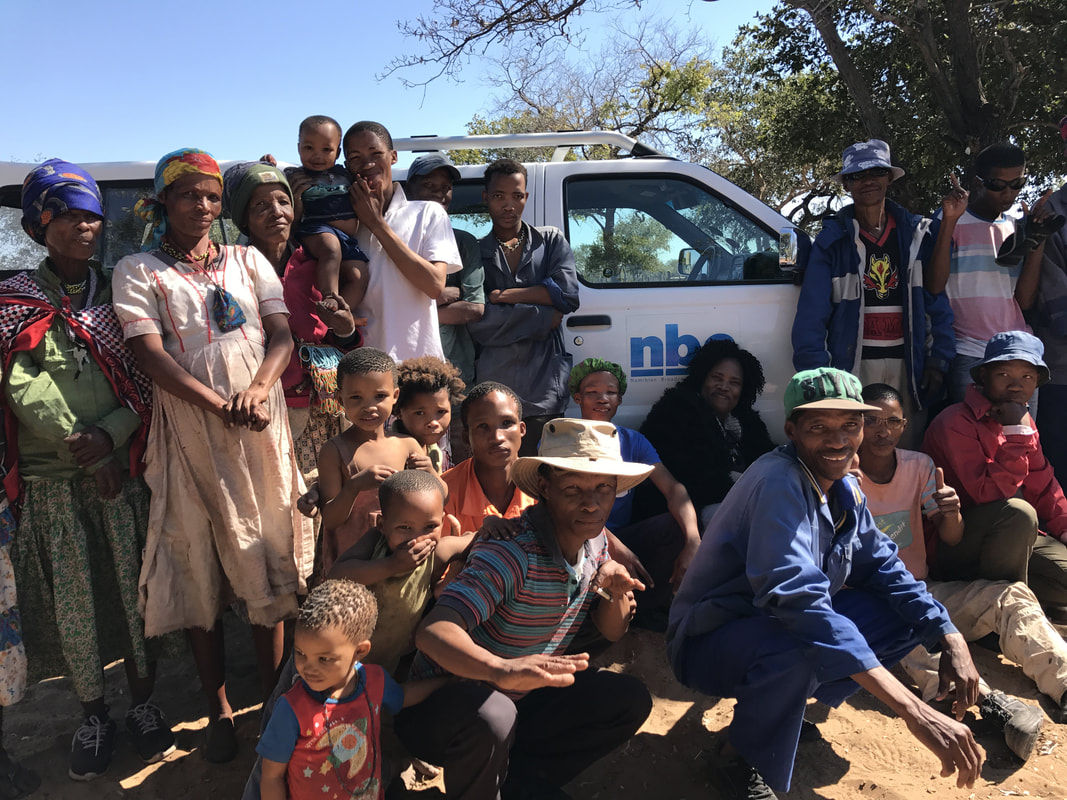|
As promised to the proposed project stakeholders, the NBC (Namibian Broadcasting Corporation) and the head of the Ju|’hoan traditional authority, Tsamkxao ǂOma, 'chief' Bobo,, we, i.e. the !Ah radio station manager, the late Teresia Mieze, interpereter and San council member, Kallie and I, have travelled north, south, east and west of the transmission tower, mostly off-road to talk to Ju|'hoan people about the idea. It’s been a shuddering, juddering, sometimes swampy three weeks (we bogged down axle-deep in mud trying to circumvent a pan of water that had obliterated the road) but it’s been encouraging. After hearing of the idea to make an on-going radio show with the Namibian Broadcasting Corporation using local talent, villagers clapped and said “we wish you could start today!” In one settlement the children chanted: ‘We are ready for the project, we are ready, we are ready!” Quick aside: in this same village, Ben se Kamp, I noticed a boy behind the squatting adults. He was grinning at me and waggling his fingers on his head. Then he flapped his folded arms at his side like wings. Of course! He’d been in the class I’d done storytelling with the previous year. He must have remembered the story they made up about a guinea fowl mother who saves her children from a hyena. I certainly did. It was a great story, a brilliant example of the collaborative learning the San are so good at. Afterwards the kids did a triumphant guineafowl dance around the tented classroom, waggling their fingers like guinea fowl coxcombs. The funding stream I’m targeting is the UNESCO International Fund for Cultural Development. However, applications only open in December 2017 and approved projects can only begin in March 2019. Sigh. We have now visited 14 of the current 37 Ju|’hoan villages and approval of the proposed idea has been universal. I’ve learned that functioning radios are in short supply and that listeners want more Ju|’hoan native speakers as announcers. I’ve also heard stories that I think will make excellent material for the drama, and I’ve met individuals who are obviously naturally talented performers. Most importantly, it’s become clear that everyone wants a chance to audition if/when we secure funding for the khuitzima. Gasp. That could be hundreds of people coming in from the outlying villages alone. And they’ll have to be housed and fed. The logistics are daunting. I discuss the problem with Melissa Heckler and Prof Bob Hitchcock. He’s co-director of the Kalahari People’s Fund. (Yes, the one I ask buyers of my novels to donate to in lieu of a purchase price.) They have a great idea – a storytelling festival, all interested parties invited, and the NBC recording performances as a way to build up a database of actors and material for the drama. Bruce Parcher, in charge of San Culture and Education for TUCSIN (The University Centre for Study in Namibia) says they can help too. Whew! “Let’s call a halt on visiting villages,“ I tell Teresia and Kallie. “You’ve got a radio station. Let’s use it to broadcast news of the khuitzima. So we did, and in the process discovered that Kallie is a pretty good announcer.
1 Comment
Leave a Reply. |
AuthorAfrican novelist and out-to-grass, academic. Archives
January 2024
Categories
All
|

 RSS Feed
RSS Feed